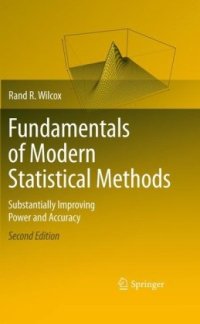
Ebook: Fundamentals of modern statistical methods: Substantially improving power and accuracy
Author: Rand R. Wilcox (auth.)
- Tags: Statistics for Social Science Behavorial Science Education Public Policy and Law
- Year: 2010
- Publisher: Springer-Verlag New York
- Edition: 2
- Language: English
- djvu
Conventional statistical methods have a very serious flaw. They routinely miss differences among groups or associations among variables that are detected by more modern techniques, even under very small departures from normality. Hundreds of journal articles have described the reasons standard techniques can be unsatisfactory, but simple, intuitive explanations are generally unavailable. Situations arise where even highly nonsignificant results become significant when analyzed with more modern methods.
Without assuming the reader has any prior training in statistics, Part I of this book describes basic statistical principles from a point of view that makes their shortcomings intuitive and easy to understand. The emphasis is on verbal and graphical descriptions of concepts. Part II describes modern methods that address the problems covered in Part I. Using data from actual studies, many examples are included to illustrate the practical problems with conventional procedures and how more modern methods can make a substantial difference in the conclusions reached in many areas of statistical research.
The second edition of this book includes a number of advances and insights that have occurred since the first edition appeared. Included are new results relevant to medians, regression, measures of association, strategies for comparing dependent groups, methods for dealing with heteroscedasticity, and measures of effect size.
Rand Wilcox is a professor of psychology at the University of Southern California. He is a fellow of the Royal Statistical Society and the Association for Psychological Science. Dr. Wilcox currently serves as an associate editor of Computational Statistics & Data Analysis, Communications in Statistics: Theory and Methods, Communications in Statistics: Simulation and Computation, and Psychometrika. He has published more than 280 articles in a wide range of statistical journals and he is the author of six other books on statistics.
Conventional statistical methods have a very serious flaw. They routinely miss differences among groups or associations among variables that are detected by more modern techniques, even under very small departures from normality. Hundreds of journal articles have described the reasons standard techniques can be unsatisfactory, but simple, intuitive explanations are generally unavailable. Situations arise where even highly nonsignificant results become significant when analyzed with more modern methods. Without assuming the reader has any prior training in statistics, Part I of this book describes basic statistical principles from a point of view that makes their shortcomings intuitive and easy to understand. The emphasis is on verbal and graphical descriptions of concepts. Part II describes modern methods that address the problems covered in Part I. Using data from actual studies, many examples are included to illustrate the practical problems with conventional procedures and how more modern methods can make a substantial difference in the conclusions reached in many areas of statistical research. The second edition of this book includes a number of advances and insights that have occurred since the first edition appeared. Included are new results relevant to medians, regression, measures of association, strategies for comparing dependent groups, methods for dealing with heteroscedasticity, and measures of effect size.